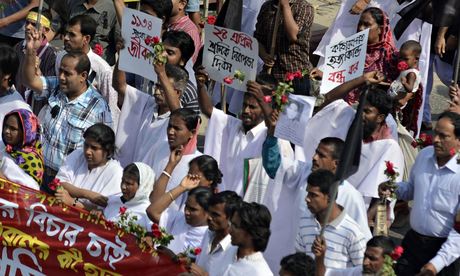This week was the one year anniversary of the Bangladesh tragedy. According to CBC News:
“More than 1,100 workers died and about 2,500 were injured on April 24, 2013, when the dangerously built eight-storey Dhaka-area building collapsed, the worst garment industry accident in history.”
This past Thursday, thousands of protestors returned to the site:
“The demonstrators – who included injured survivors and the families of the deceased – marched to the ruins of the nine-storey building carrying flowers and chanting slogans including “We want compensation!” and “Death to Sohel Rana!”, the owner of the building.”

Some of the protestors arrived dressed in funeral shrouds.
When an obvious case of injustice like the collapse of the Rana Plaza factory in Bangladesh occurs, a lot of people start asking what we as a global community can do in order to prevent that kind of thing from happening again.
I remember when I was a young(er) and angsty(er) student in my first year of University, an English professor showed us a documentary called The Corporation. Man, did it ever get me riled up. I challenged myself to only buy fair trade and secondhand goods from that point on. I didn’t want anything I bought or wore to be made in a sweatshop.
All things considered my plan lasted longer than you might think. Then again, I was a single, childless student who still mooched off her parents more than she’d care to admit.
The other day I stumbled across this documentary. It offers a bit of a balance to that mission against sweatshops I set out on only a few years ago.
This short look into the life of Jasmine, a woman who works in a Bangladesh garment factory, doesn’t exactly promote going out to buy sweatshop goods, but it does remind us that the whole issue is more complex than it may seem.
If I really cared about the fate of women like Jasmine as much as I would love to pretend, my efforts would extend beyond buying a product that makes me feel better about myself.
In her book (and documentary), No Logo, journalist Naomi Klein traces how outsourcing products became the norm as the brand became the most important feature of an object. While we’d love to hold these companies responsible for the treatment of the workers making their products, outsourcing means they are making a contract with a third party. They may reap the profits from that product, but it is the third party who will generally be held responsible for any incidents.
“Of the 29 western brands who sourced clothes from Rana Plaza factories, about half have deposited $15m into the fund, the Clean Clothes Campaign said. The first payments of $640 for each of the survivors and families of the deceased were only made this week.”
While this compensation is certainly better than nothing, capitalism will continue to drive companies to value “the bottom line” above human life. That’s where government should come in.
Government should govern. And it’s hard to do that when you are letting people die. Unfortunately some governments hold more power than others, which allows them to pressure less powerful countries to do things they may not have decided of their own volition. This is visible in the way the U.S. government “fought To Lower Minimum Wage In Haiti So Hanes And Levis Would Stay Cheap“. Or how Canadian mining companies have attempted to manipulate Latin American politics in order to gain access to resources, and even been linked to violence against mine protestors.
So what do we regular people do? Well, my small go-to is often petitions. Like the petition the United Church presented to the Canadian Government about regulating international mining processes. For those of you who don’t have much faith in the bureaucratic side of things, there is sometimes the possibility to serve on the ground, or contribute to NGO’s who do. You can think about voting with your dollar, or try to pressure companies to take up better practices.
Ultimately, I don’t have THE answer. The more I study the ethics of fashion the more complex I realize it is. The biggest thing I want to encourage you to do is not give up. We see tragedies like what happened in Bangladesh and it just seems too big to even try to care about. But we need to care. We need to not forget, because if it was our loved one who had been trapped in that building we would have found a way to change the system by now.























